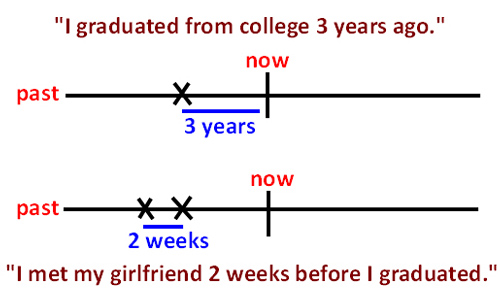The Difference Between ‘Before’ and ‘Ago’.
The key to surviving in English speaking territories, including your popular television shows, Internet shows, music, and even politics, is having a good grasp on your understanding of definitions and grammar. Here in this article, the discussion will come to analyze and define the difference between the words, “Before” and “Ago”. Let’s take a look at some of the definitions and examples that we can use to understand our language a little more clearly.
The word before can be used in three different ways, as a preposition a conjunction and an adverb. Careful study and practice is recommended to understand fully and clearly how to communicate the word with diligence and success.
Contrarily yet similarly the word ago is used as an adverb and has one primary definition. It is recommended that careful study is included for this word as well. It is recommended to study and analyze the word ago before you study before because of the simplicity of the word ago. It is much easier to cram it into the memory with its one and simple definition and examples rather than the three definitions of before with its complex fifteen sentences.
Before: Preposition, Conjunction, and Adverb.
Definition 1: The period of time that precedes a particular event, date or time.
Example 1: He had to leave before his appointment time was due.
Example 2: Before she went to the store, she put her jacket on.
Example 3: Three years before her graduation, she was only practicing to be a student.
Example 4: Long before there was the egg, there was the chicken.
Example 5: Before she went to the judge to claim innocence, she prepared her papers.
Synonyms: Preliminary to, in preparation for, preparatory to, earlier than, previous to, prior to.
Antonyms: After
Definition 2: In the front of.
Example 1: The president of the corporation stood before his people.
Example 2: Before the exit ramp on highway 403, there is a bent side rail.
Example 3: She went before the court only to be judged as innocent.
Example 4: At 12:00 noon, before the coast line, the tide comes in.
Example 5: Before the verdict, she looked bemused.
Synonyms: In the sight of, in the presence of, in front of.
Antonyms: Behind, away from.
Definition 3: In the preference to; with a higher priority than.
Example 1: A lady who had placed all duty before all else.
Example 2: Death before dishonour.
Example 3: Gold is has a higher place value than silver, and goes before it on a scale of comparison .
Example 4: He goes before her in line.
Example 5: You must eat your vegetables before you get your dessert.
Synonyms: In preference to, rather than, sooner than.
Antonyms: Later than, rather not, unprefered.
Examine the above definition with real life examples to show you just how he word before is used in the English language. The primary definition that is used in English is ‘the period of time that precedes a particular event, date or time.’ Before you move onto the usage and definition of ago, it is recommended that familiarization is taken with ATLEAST the primary description of before. The word before is considered an informal word.
Ago: Adverb
Definition 1: Before the present ( in time – user after a measurement of time); earlier.
Example 1: A long time ago, there was a princess named Tamaralin Bunylin.
Example 2: She left for the store a while ago.
Example 3: A bit ago he found himself on the corner block.
Example 4: A little while ago was when she got on the bus.
Example 5: He put his shoes on a little while ago.
Synonyms: Heretofore, previously, back, since, before, earlier, in the past.
Antonyms: In the beginning, beginning, starting, alpha.
The word ago is distinctly different from the word before. There is the slight possibility of confusion between the definitions. The definition of ago is simply, ‘before the present,’ whereas the definition of before is, ‘ the period of time that precede a particular event, date or time.’ One is a difference of time, the other is a difference of place in time. Ago is more of an outdated kind of word when spoken in the English language. It is considered formal and usage of it is rare.
Discuss and examine the words before and ago intellectually and socially in your everyday life. This will help you get the hang of it and the ease of their usages will come in time. Practice using them in a wide variety of literary and social situations. Practice writing with the words as this method of comprehension demonstration will allot you the most reward.
- Difference between bemused and amused - January 2, 2015
- Difference Between Gossip and Slander. - November 19, 2014
- The Difference Between ‘Before’ and ‘Beforehand’. - November 18, 2014

